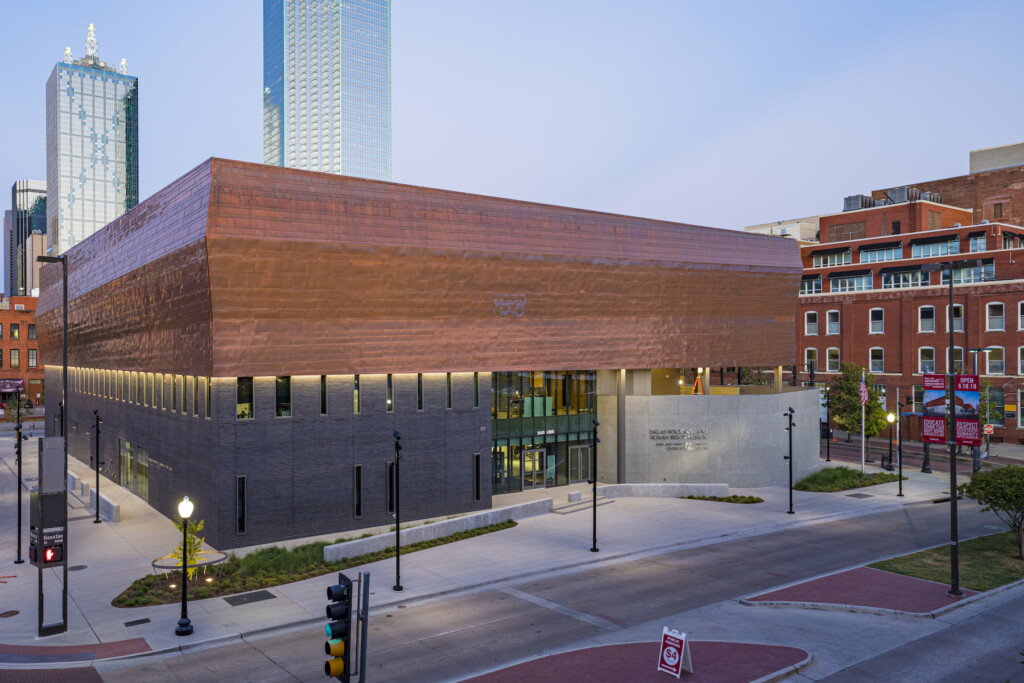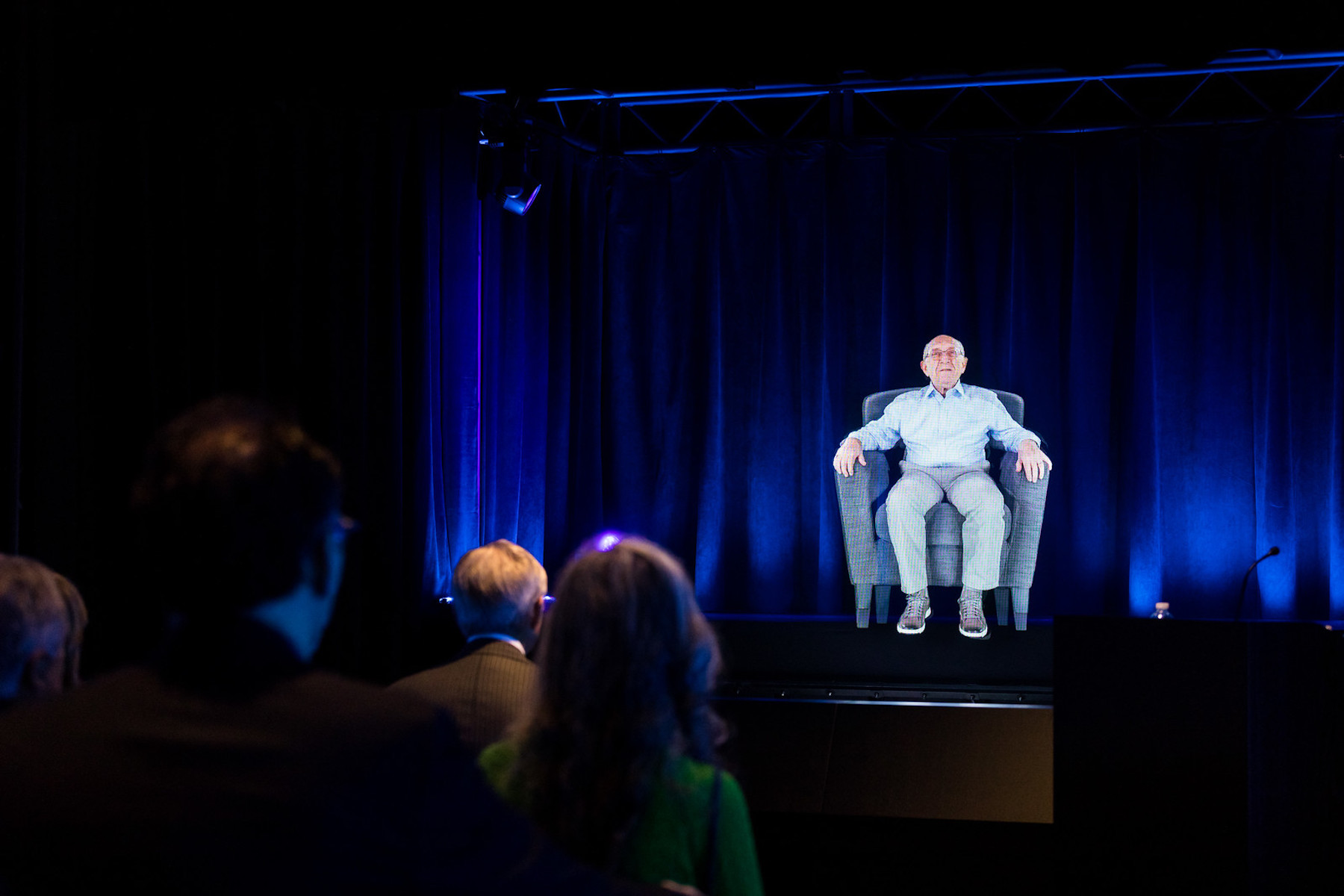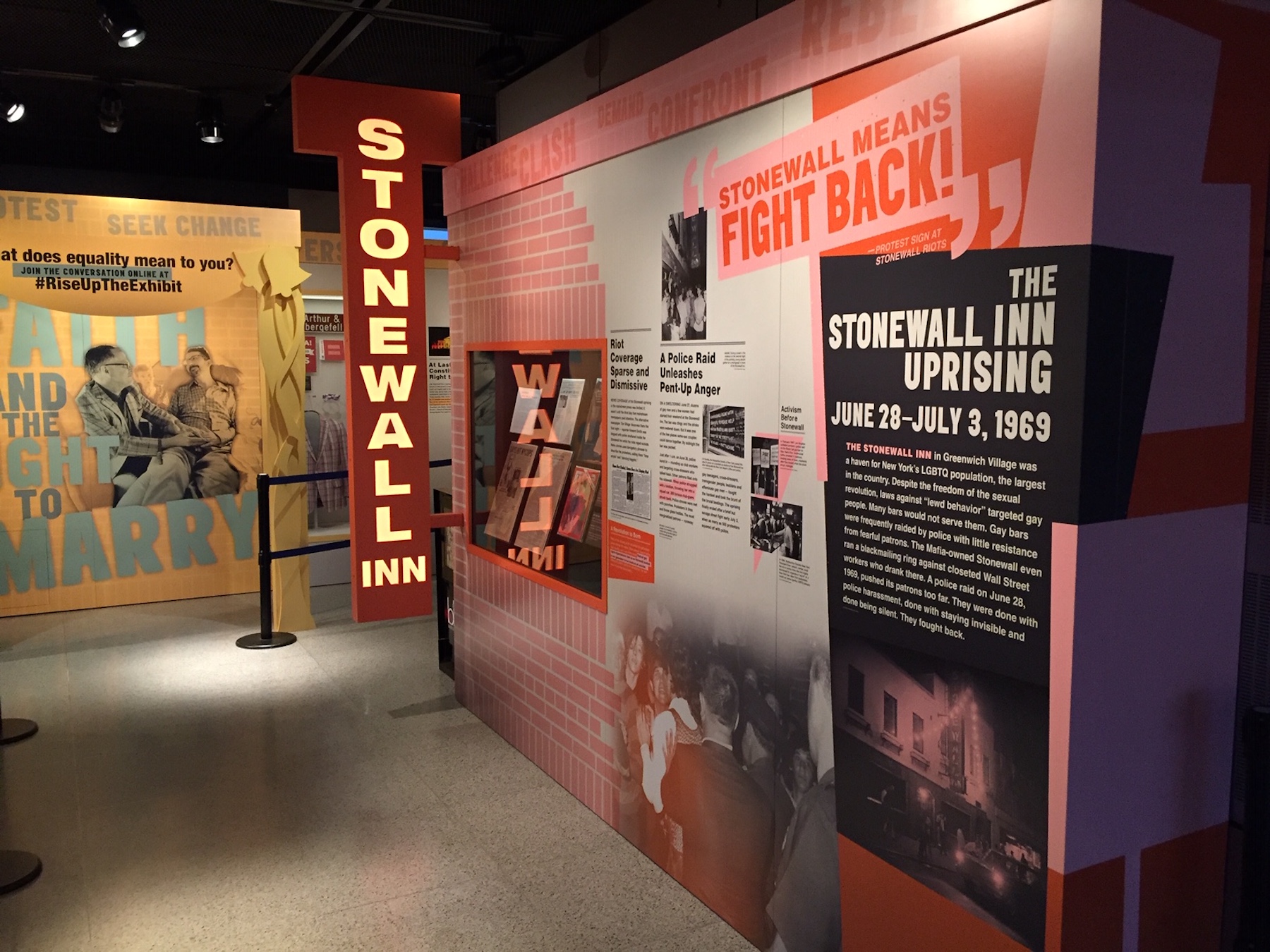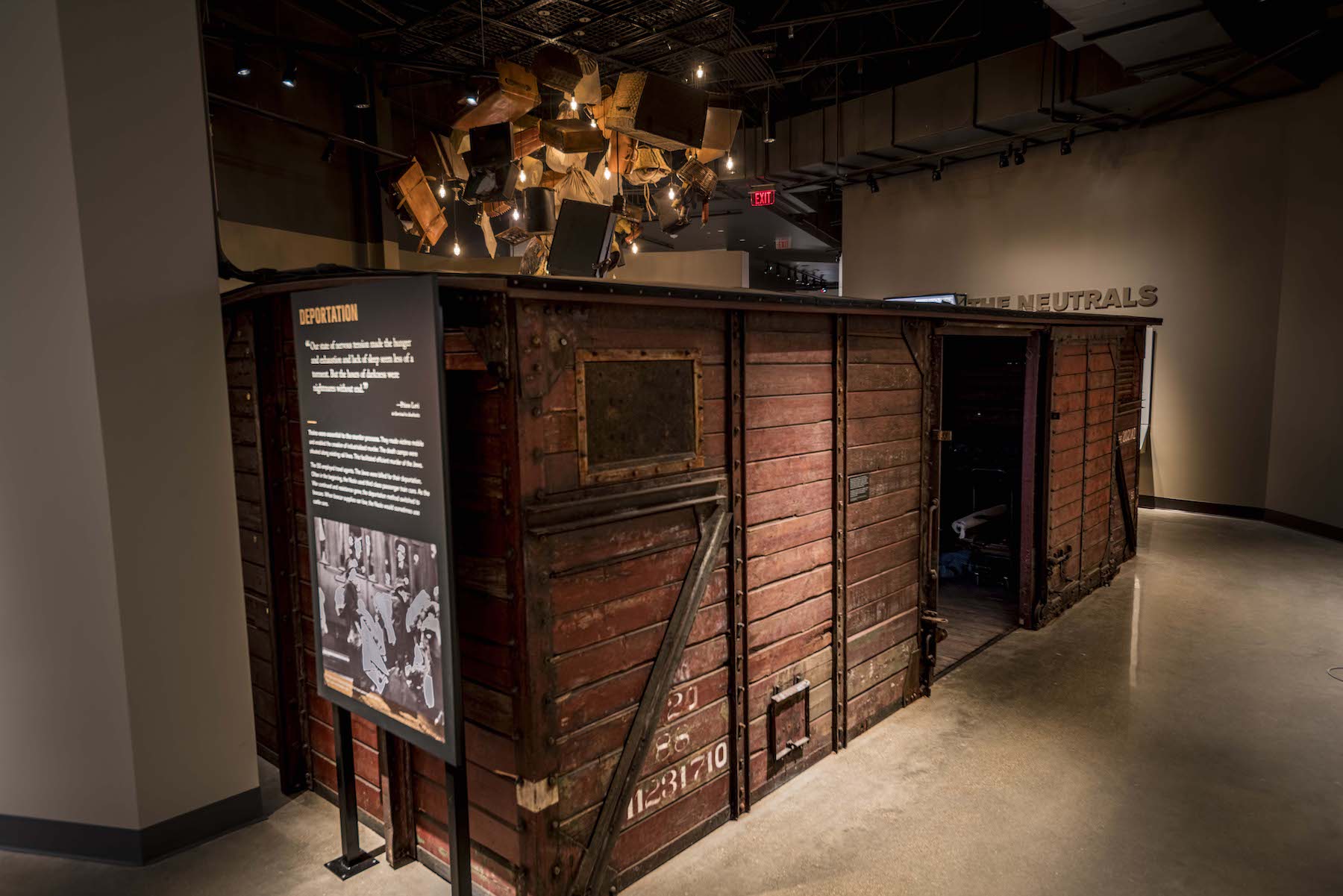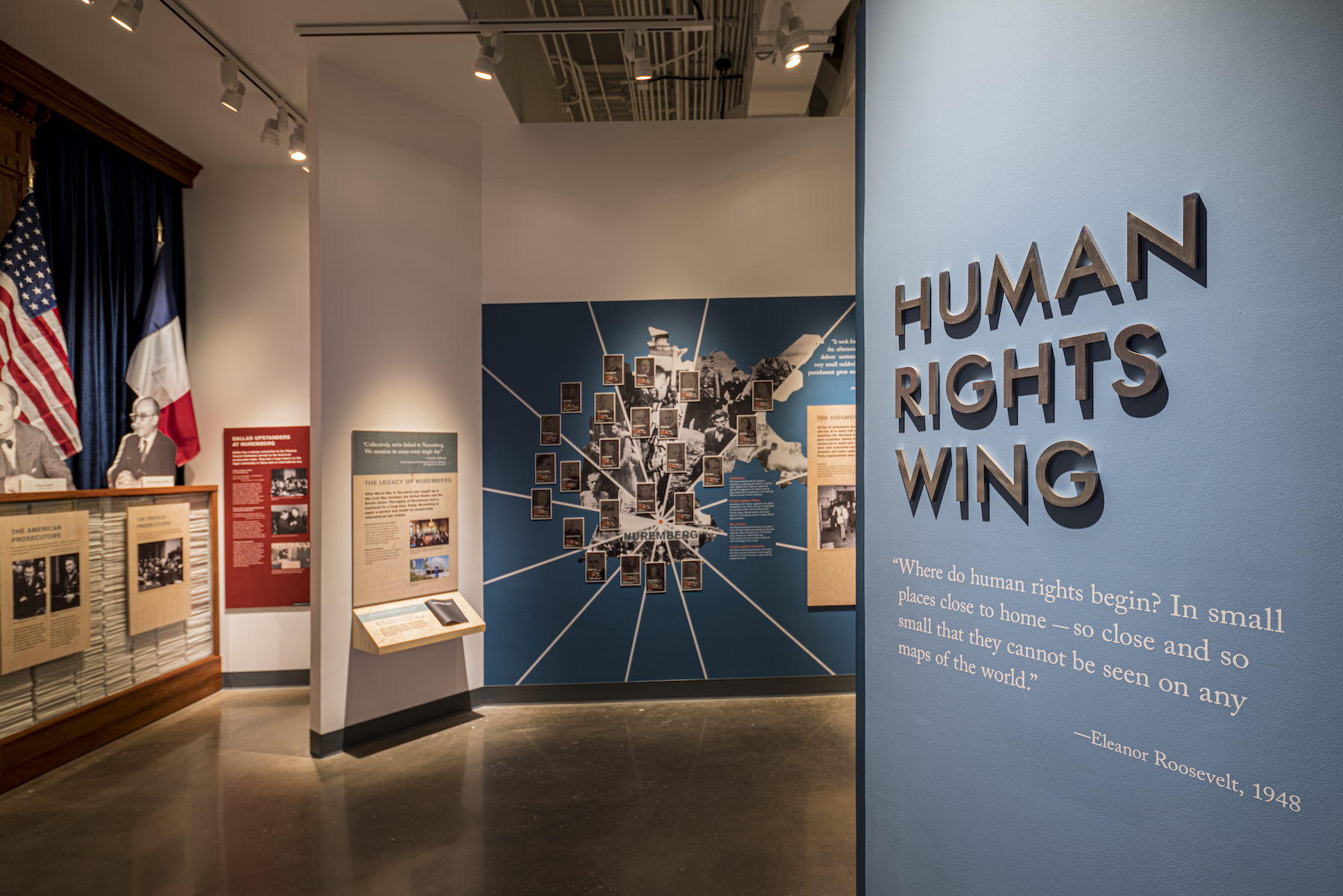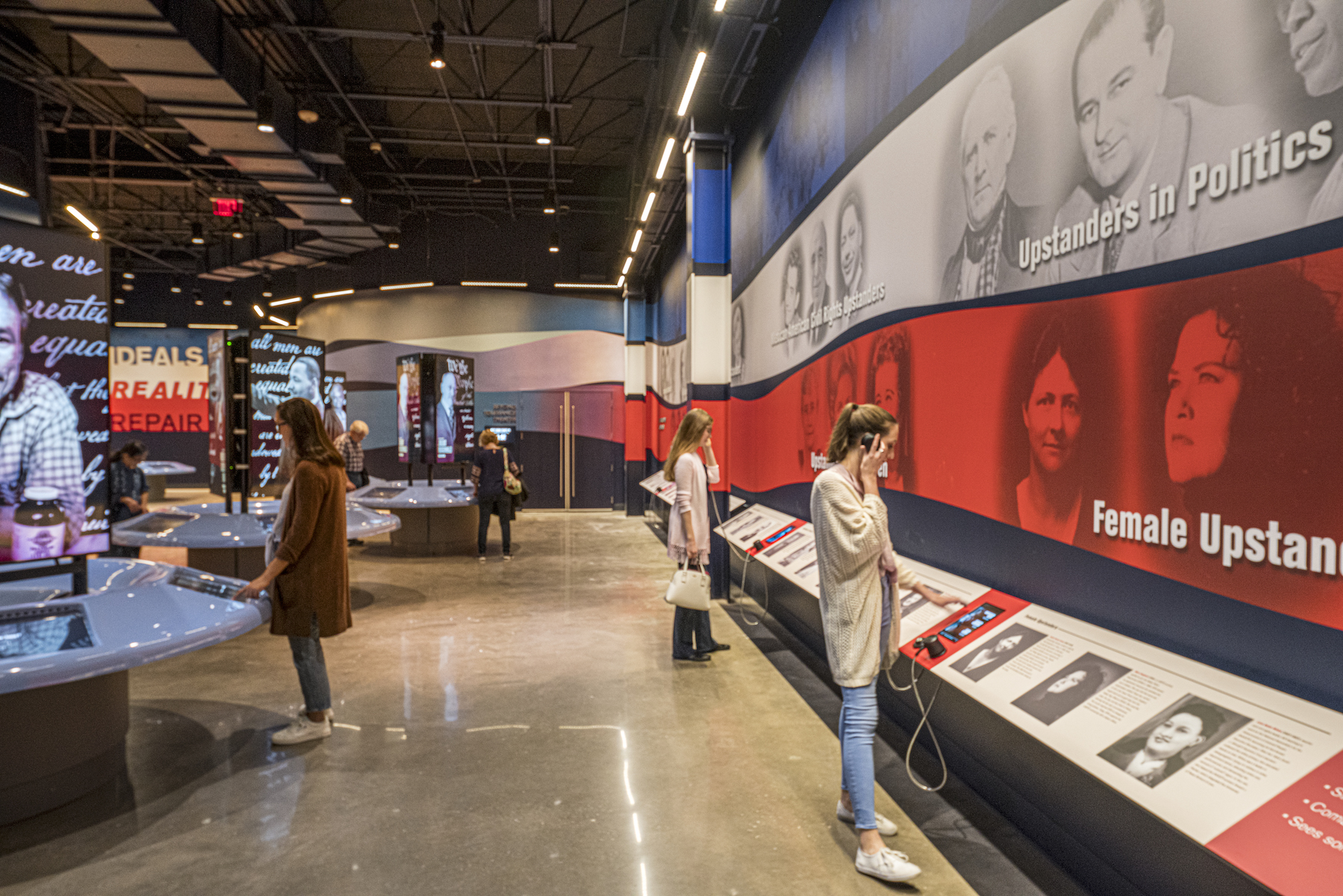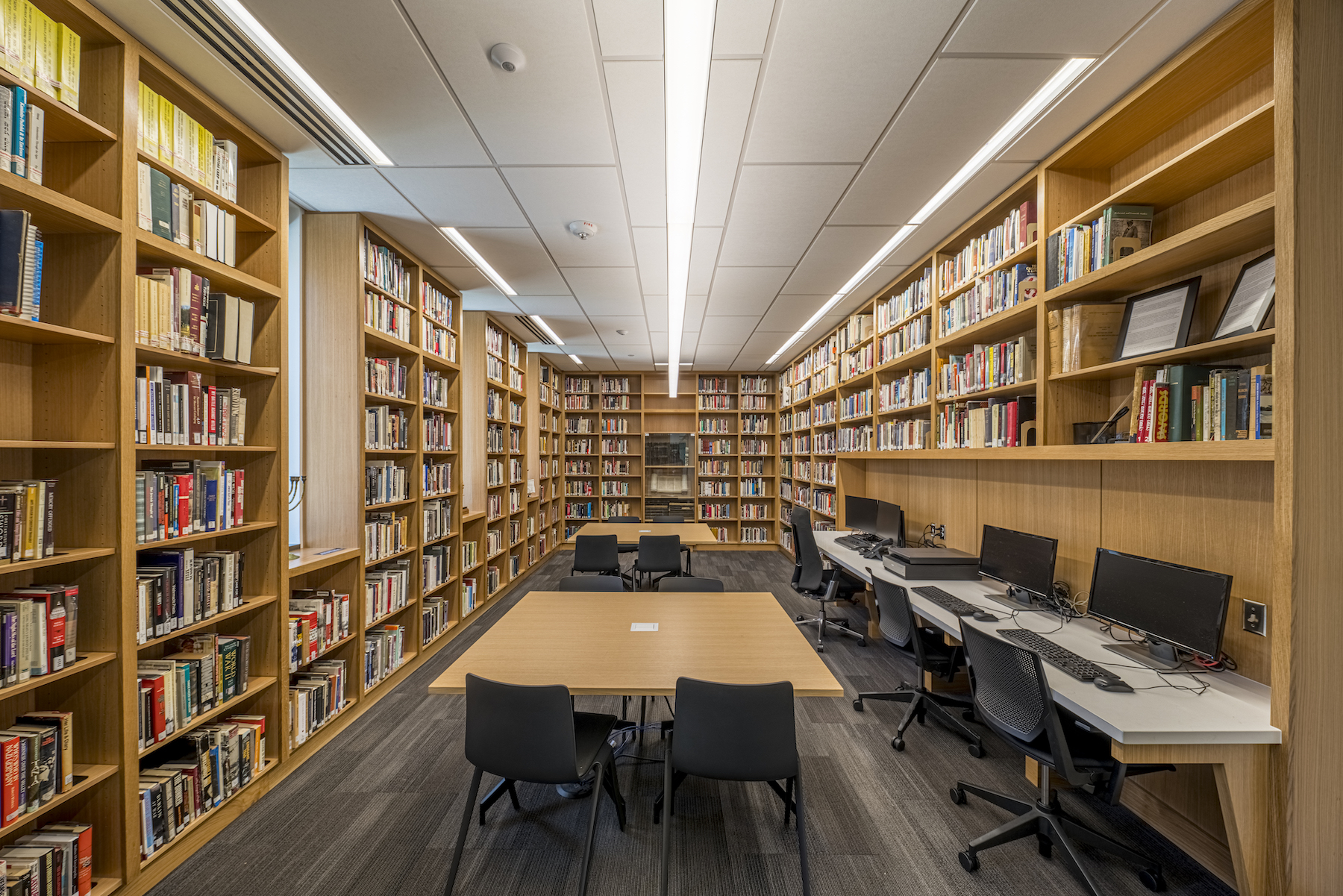Longtime Dallasites may remember taking a school field trip or a family excursion to the Dallas Holocaust and Human Rights Museum. Open since 1984, it was originally a small Museum focused on the history of the Holocaust and a place for remembrance of the 6 million Jews who were murdered. The Museum was founded by a small group of Holocaust survivors who wanted a designated place where future generations could learn about the dire consequences of prejudice and hatred.
Today, the Museum teaches the crucial lessons from the Holocaust and has expanded its mission to include educating about the importance of human rights to combat prejudice, hatred, and indifference. Since 2019, the Dallas Holocaust and Human Rights Museum has been in its permanent home on Houston Street in downtown Dallas, in a stunning new, 55,000-square foot building.
“There are broader stories we tell,” says Mary Pat Higgins, president and CEO of the Museum. “We teach the lessons of human rights violations through historical genocides and tell the stories of America’s journey for civil rights. I know a lot of people in Dallas remember this as a small Museum they visited as children. The visit likely had an impact on them, but now there is so much more to see and learn. We intentionally highlight who we call ‘upstanders’–people and organizations throughout history who stood up against injustice and hatred in a variety of different ways. Our hope is to inspire people to stand up and speak out.”
By sharing the lessons learned from the Holocaust and other human rights violations, the Museum inspires visitors to become upstanders by confronting hatred and promoting human dignity in Dallas and beyond. Here are six reasons to plan your visit to the Dallas Holocaust and Human Rights Museum.
Meet Max at the Dimensions in Testimony℠ Theater.
The Dallas Holocaust and Human Rights Museum is one of only two Museums in the world to feature a specialized Dimensions in Testimony℠ Theater, which allows visitors to interact with Holocaust survivors in perpetuity. Using high-definition recording and voice activation, and holographic imagery, Dimensions in Testimony℠ was developed by the USC Shoah Foundation. It offers the rare opportunity to sit across from a survivor and ask them questions about their life and survival. Rotating weekly, there are 12 different survivor speakers featured in the Dimensions in Testimony℠ Theater, including local Holocaust survivor Max Glauben who is featured every Friday. At the time of liberation, Max was a 17-year-old orphan who had witnessed and survived the unimaginable, including the murder of his parents and brother. Visitors can ask him questions about his childhood in the Warsaw Ghetto, his time in six different camps, liberation while on a death march, and his life after the war when he moved to Dallas, married, raised a family, and helped found the Dallas Holocaust and Human Rights Museum. Max passed away at the age of 94 in 2022. He inspired upstanders with the thousands of talks he gave about his experiences in the Holocaust and continues to do so through Dimensions in Testimony℠.
Don’t Miss Rise Up: Stonewall and the LGBTQ Rights Movement Special Exhibition.
Presented by Texas Instruments, Rise Up: Stonewall and the LGBTQ Rights Movement is on view until June 18, 2023, and explores the June 1969 police raid of the Stonewall Inn in New York’s Greenwich Village and the modern LGBTQ rights movement in the United States. The uprising that followed the raid was a pivotal moment in the modern gay liberation movement and the ongoing fight for LGBTQ civil rights. Rise Up highlights the events that led to the Stonewall Inn riots and other key moments in LGBTQ history.
Make Time for the Permanent Exhibitions.
The Museum’s introspective exhibitions are grouped into three main spaces where some of humanity’s most incredible stories of struggle and courage live on.
The Holocaust/Shoah Wing (Shoah is the Hebrew word for “catastrophe”) explores an incredible period in world history through a geographically oriented exhibition that leads visitors across Europe and back, from 1933 to 1945. Learn about the savagery of the Einsatzgruppen (Nazi Germany’s paramilitary death squads), their acts of individual murder and terror, followed by the events that culminated in the “Final Solution,” and the industrialized killing of the Nazi death camps. There are also testimonies of Holocaust survivors and liberators that personalize the visitors’ journey and lend history a voice.
In the Human Rights Wing, thought-provoking installations detail how the world has progressed since the Holocaust. Highlights include the International Military Tribunal at Nuremberg, where Nazi leaders faced charges of crimes against humanity and war crimes; the Universal Declaration of Human Rights, based on the four foundations of dignity, liberty, equality, and brotherhood; and the Ten Stages of Genocide, where 10 monumental art installations depict historical and contemporary genocides.
The Pivot to America Wing is equal parts inspiration and participation. Through interactive kiosks, brief films, and remembrances, visitors can explore America’s founding ideals, the history of 12 different groups of Americans, and the repair process by which we work to bring our ideals more closely into accord with our reality. Two of the most moving and informative exhibits are of Piccadilly Cafeteria, where personal testimonies help you experience Dallas’ cafeteria sit-in for civil rights, and the Beyond Tolerance Theater, which inspires visitors to confront their own biases and consider new responses to them.
Become Inspired by Dallas’ Fellow Upstanders in the Pivot to America Wing.
Explore Upstanders who made a meaningful difference for Dallas.
Clarence Broadnax’s actions sparked a major event in Dallas’ civil rights movement. On May 29, 1964, he decided to buy lunch at the Piccadilly Cafeteria in downtown Dallas. While standing in line to order, the owner approached him and said that Piccadilly did not serve Blacks. He and other local civil rights leaders, including Juanita Craft and Reverend Earl Allen, led a peaceful protest for 28 days, with 350 protesters, Black and white, showing up on the first day. The protestors and the cafeteria reached an agreement shortly before the Civil Rights Act of 1964 became law.
Francisco “Pancho” Medrano’s impact extended across Texas and the rest of the country. After taking a job at the local North American Aviation plant, Medrano joined the United Auto Workers and became involved in union work, eventually working for UAW full-time. Medrano was a prominent advocate for Chicano civil rights causes. Locally, he led a march in response to the shooting of Thomas Rodriguez and his wife during a police raid and was active in community responses after the 1973 police shooting of 12-year-old Santos Rodriguez. Medrano also helped create the Dallas chapter of the American G.I. Forum and joined the executive committee of the Tejano Political Action Committee.
Louise Raggio was the only woman in her law school class at SMU in 1952. She later became the first female Assistant District Attorney in Dallas County and the first female prosecutor in the county. Raggio established legal clinics to educate women on Texas laws and became the chairperson of the Texas State Bar Family Law Section, chairing the drafting committee of the Marital Property Act of 1967, which gave women control over their personal earnings and allowed them to sign contracts pertaining to community property, rather than requiring them to turn over control to their husbands. She also helped establish a paternity statute so that unmarried women could legally be considered parents and receive child support.
George Bannerman Dealey, publisher and owner of The Dallas Morning News, launched his career in journalism as a teenager when he became an office boy for The Galveston News, owned by A.H. Belo. At 26, he was sent to Dallas to establish and manage the local paper. In 1920, Dealey became president of A.H. Belo & Company (later the A.H. Belo Corporation). In the 1920s, Dealey used his influence with The Dallas Morning News to stand against the Dallas Ku Klux Klan. Many Klan members were city leaders, including judges, police officers, lawyers, and doctors. Dealey spoke against the Klan through editorials and published reports on Klan crimes, despite the economic danger his actions posed to the paper.
Take Part in Community Programs.
The Museum offers a variety of ways to connect with history and expand your knowledge of today’s headlines through community programs and lectures. Upcoming events include the Funk Family Upstander Speaker Series, which highlights leaders who stand up to injustice on a local, national, or global level, featuring Opal Lee, the “Grandmother of Juneteenth,” on February 7, and Masih Alinejad, Iranian-American journalist, on March 22. On March 1, the Museum launches a new series, Rule of Law, with Anne Applebaum, Pulitzer Prize-winning historian and journalist.
Examine Artifacts of the Past.
The Museum’s Helen and Frank Risch Family Library & Archives provides access to rare books, manuscripts, oral histories, and artifacts while preserving them for future generations. The collection includes more than 17,000 items documenting the history of the Holocaust and human rights in a local context. Research appointments are available.
Admission to the Dallas Holocaust and Human Rights Museum is $19 for adults and $12 for students. Admission for seniors 55+, educators, visitors with disabilities, members of the military, and first responders is $17. Special exhibitions are included in admission. Reserve your admission tickets at https://www.dhhrm.org/visit/general-admission/. Apply the price of admission to become a member today and enjoy year-round membership benefits. Learn more about becoming a member here.
The Dimensions in Testimony℠ Theater is included with Museum admission. Dimensions in Testimony℠ runs on the hour every hour with the first experience beginning at 11 a.m. and the last experience beginning at 4 p.m. Space is limited. Tickets for Dimensions in Testimony℠ can be obtained at the Guest Services Desk when you arrive at the Museum. The 250-seat Cinemark Theater features an exclusive survivor testimony film. This film runs every hour on the hour and is included with Museum admission.
Signup for D Exclusive
Author



